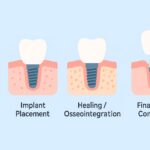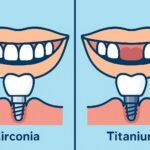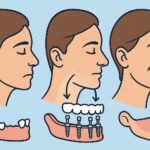Dental implants offer a reliable solution for replacing missing teeth, but they require a careful healing process to be successful. After the procedure, patients often wonder when they can return to normal habits — including drinking wine. While it may seem harmless to have a glass during recovery, wine can interfere with the body’s ability to heal and compromise the stability of the implant.
More importantly, wine is not just a short-term risk — its regular consumption poses long-term threats to oral and overall health. Knowing when and if it’s safe to drink wine after dental implants can help protect your investment and support your well-being.
How Dental Implants Heal: The Critical First Weeks
The healing process after dental implant surgery is essential to the long-term success of the implant. Once the titanium post is inserted into the jawbone, the body begins a process called osseointegration, where the bone grows and bonds tightly around the implant. This process typically takes 3 to 6 months, but the initial weeks are the most critical.
During the first 7 to 14 days, soft tissues in the mouth begin to close around the implant site. Blood clots form to protect the area, and inflammation helps initiate healing. Any disruption — like alcohol consumption — can interfere with this process.
Aside from bone integration, the gums must also heal properly to prevent infections and secure the base of the implant. Activities that irritate the tissues or dry out the mouth (like drinking wine) can increase the risk of implant failure, peri-implantitis, or prolonged recovery.
Your dentist may place a temporary crown or leave the site uncovered, depending on the treatment plan, but either way, avoiding anything that can disturb healing — especially in the first 2 weeks — is critical.
Why Alcohol—Especially Wine—Interferes With Healing
Alcohol is known to slow down wound healing, and wine introduces even more specific risks after dental implant surgery. Here’s why it’s especially problematic:
1. Impaired Blood Clotting and Inflammation
Alcohol thins the blood and can interfere with clot formation — a key part of the healing process after implant placement. Without a stable clot, the implant site is more exposed to infection and delayed tissue repair.
2. Disruption of Osseointegration
The bonding of bone to the implant requires a stable, inflammation-free environment. Alcohol has been shown to negatively affect bone metabolism, weakening the body’s ability to integrate the titanium post properly. This can lead to loose implants or even complete failure.
3. Wine’s Acidity and Sugar Content
Unlike other alcoholic drinks, wine is both acidic and often high in sugar. These two elements contribute to enamel erosion, irritation of soft tissues, and an increase in harmful oral bacteria. After dental implant surgery, this puts added strain on healing gums and increases the risk of infection.
4. Dry Mouth and Dehydration
Alcohol dehydrates the body and reduces saliva flow, which is essential for keeping the mouth clean and supporting tissue repair. A dry environment around the implant site increases the chance of inflammation and bacterial growth.
In short, wine isn’t just a general health risk — it directly interferes with every key component of implant recovery: blood flow, tissue healing, and bone integration.
When Can You Drink Wine After Dental Implants?
Most dentists recommend avoiding all forms of alcohol — including wine — for at least 72 hours to 2 weeks after dental implant surgery. This is the period when soft tissue healing and clot formation are most vulnerable. However, that’s only the beginning.
For long-term success, many dental professionals advise waiting until osseointegration is well underway — typically 3 months or longer — before resuming any alcohol consumption. Even then, drinking should be limited, and only if the implant site is free from inflammation, pain, or signs of infection.
Here’s a general guideline:
- First 72 hours: Absolutely no alcohol. This is the critical clotting and inflammation period.
- First 2 weeks: Continue avoiding alcohol to allow soft tissue to heal.
- 3 to 6 months: If healing is progressing well and approved by your dentist, limited alcohol may be safe.
- After 6 months: Drinking may resume in moderation, but with caution — especially with acidic drinks like wine.
The timeline can vary based on your overall health, implant complexity, smoking habits, and oral hygiene. Always consult your oral surgeon or dentist before introducing alcohol back into your routine. But even when “safe,” the next section explains why avoiding wine may still be the smarter choice.
Why You Should Reconsider Wine Altogether
Even if your dental implants have fully healed, regular wine consumption continues to pose risks to both your oral and overall health. While moderate drinking is often portrayed as harmless — or even beneficial — the science paints a different picture.
1. Wine Contributes to Gum Disease and Implant Failure
Wine’s acidity and alcohol content can irritate the gums and disrupt the balance of oral bacteria. Over time, this increases the risk of peri-implantitis, a serious condition that causes inflammation around implants and can lead to bone loss and implant failure.
2. Enamel Erosion and Tooth Sensitivity
Wine, especially red and white varieties, is highly acidic. It gradually wears down enamel on natural teeth, leading to sensitivity, discoloration, and a higher risk of decay — all of which threaten the stability of surrounding teeth and the implant’s health.
3. Increased Cancer Risk
Alcohol, including wine, is classified as a Group 1 carcinogen by the World Health Organization. Regular consumption is linked to cancers of the mouth, throat, liver, and breast. There’s no “safe” level of alcohol when it comes to cancer risk.
4. Wine’s “Heart Health” Reputation Is Misleading
Claims that wine supports heart health are based on outdated and selectively interpreted studies. Newer, large-scale research has shown that even light drinking increases health risks, and the supposed benefits of wine can be achieved more safely through diet, exercise, and stress management.
5. It’s Addictive — and Socially Normalized
Wine often escapes scrutiny because of how socially accepted it is. But regular use — even just one glass per day — can lead to dependency, sleep disruption, and chronic health issues over time.
In short, even after the implants have healed, wine adds no health value and introduces multiple risks. For those who want to protect their oral investment — and their long-term wellness — cutting out wine entirely is worth serious consideration.
Safer Alternatives and Post-Implant Tips
If you’re recovering from dental implant surgery — or simply want to protect your oral health — there are safer choices that support healing and help maintain long-term implant success.
1. Choose Healing-Friendly Drinks
Instead of wine or other alcoholic beverages, opt for:
- Water: Hydrates tissues and supports natural healing.
- Herbal teas (non-caffeinated, unsweetened): Offer anti-inflammatory benefits without acidity.
- Smoothies: Nutrient-rich, soft on healing gums, and easy to digest. Avoid adding citrus or sugar.
2. Maintain Strict Oral Hygiene
After dental implants, brushing gently around the implant site and using a non-alcoholic mouthwash helps prevent infection. Flossing (or using a water flosser) is also essential once healing allows.
3. Avoid Smoking and Sugary Foods
Like alcohol, smoking slows healing and increases the risk of implant failure. Excess sugar promotes inflammation and bacterial growth — both harmful during recovery and beyond.
4. Stick to a Soft Diet Initially
Chewing hard foods can disturb the implant site. Stick to soft, nutrient-dense foods like mashed vegetables, cooked grains, yogurt, and protein-rich broths in the first weeks.
5. Consult Your Dentist Before Reintroducing Any Risky Habits
Before resuming alcohol or other habits, get a professional check-up to confirm that healing is complete. Dentists can spot early signs of inflammation or bone loss that aren’t obvious to patients.
Choosing healthier alternatives and being cautious during recovery can make a significant difference in the longevity and success of your dental implants.
Conclusion
Wine may seem like a harmless indulgence, but after dental implant surgery, it’s one of the worst choices you can make — both short-term and long-term. During the healing phase, wine interferes with clotting, slows down osseointegration, and irritates the delicate tissues around the implant site. Even after recovery, regular wine consumption increases your risk of gum disease, enamel erosion, and even oral cancer.
Most dentists advise avoiding alcohol for at least a few weeks post-surgery, and ideally until full healing occurs — often several months. But the bigger picture is clear: your oral and general health are better off without wine at all.
Protect your investment in dental implants by making informed, health-focused choices. Recovery is temporary, but the benefits of long-term wellness are lasting — and worth far more than a glass of wine.






